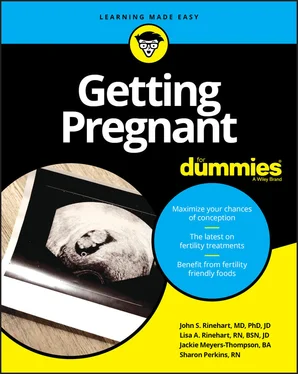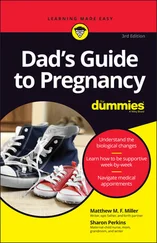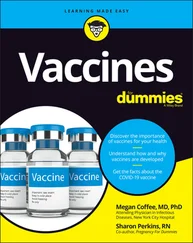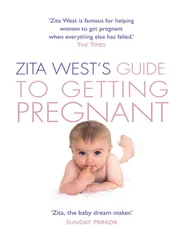Also, if a woman has been subject to the risk of Zika and is considering conceiving, she should wait at least eight weeks either from having Zika-like symptoms or exposure to try to conceive. If a male partner is at risk either from exposure or symptoms, then the couple should wait at least three months before trying to conceive. ACOG recommends that people with possible exposure or people who are considering traveling to Zika risk areas should consult their obstetrician for advice. The Zika recommendations will change as new information occurs and as possible vaccines are commercially available, so consultation with an OB should provide the latest methods for managing Zika.
STIs May Cause PID: More Than Just a “Pain in the Derriere”
Even though many of the infections discussed earlier in this chapter can be taken care of with appropriate antibiotic treatment, in some cases, there may be lingering effects.
 Severe abdominal pain with a fever should be immediately evaluated.
Severe abdominal pain with a fever should be immediately evaluated.
Pelvic inflammatory disease (PID) is an infection of the upper female reproductive system, which includes the uterus, tubes, and ovaries. PID is most commonly associated with sexually transmitted diseases and as such, starts in the vagina and moves up into the upper reproductive organs. PID classically shows itself as severe pain in the entire lower abdomen and can include a fever (a body temperature of ≥101 degrees Fahrenheit taken twice, six hours apart), a general feeling of being sick, and nausea. PID is most commonly caused by gonorrhoeae or Chlamydia trachomatis.
It has been estimated that about 10 percent of women with these infections develop PID, and PID from gonorrhoeae seems to be more severe. Frequently, other bacteria contribute to the infection. The CDC reports that the rate of PID has been decreasing. In 2006, about 0.8 percent of women between the ages of 15 and 29 contracted PID, but by 2013, this was down to about 0.6 percent, which is a 25 percent decrease. PID can cause damage to the fallopian tubes in the form of scarring or damage to the transport function of the tubes. PID can also cause general pelvic scarring and chronic pain. Estimates have reported that for young women with PID, about 20 percent develop chronic pain, 8 percent have an ectopic pregnancy, and about 15 percent have infertility. PID is treated with antibiotics, and early diagnosis and treatment decrease the long-term complications.
Exploring Specific Lifestyle Choices and Busting Some Common Myths
Most everyone knows about drinking, smoking, and drugs being bad for you when you’re trying to get pregnant. In this section, we talk about a few things that affect getting pregnant of which you may not be aware.
Gauging the truth about hot tubs — and other “short” stories
 Anything that raises the temperature of a man’s testicles can decrease sperm production and motility. Hot tubs, saunas, steam rooms, and tight underwear are out for men! Well … maybe not out altogether.
Anything that raises the temperature of a man’s testicles can decrease sperm production and motility. Hot tubs, saunas, steam rooms, and tight underwear are out for men! Well … maybe not out altogether.
It seems that the evidence for this belief is derived from a study published in 2007. Searching for other studies failed to identify any. Even the study authors cautioned that their study was a pilot study and suggested further research, but none was ever reported in searchable databases. The study looked at 11 males, asked them to stop using the hot tub, and found that 5 out of the 6 who did stop had an improvement in the motility of the semen analysis. The study did not attempt to determine whether this change increased the chance for conception. Based upon this extraordinarily weak evidence, it is hard to make a recommendation about hot tubs and fertility. A 1996 study looked at using a scrotal cooling device and infertility. The study had 25 subjects, and 16 of the 25 men had an improvement in the semen while 6 achieved a pregnancy. So admittedly, constantly heating the testicles is probably not a good idea, but there is very little evidence that heat exposure affects male fertility. Finally, a 1998 study looked at the influence of boxer shorts on male fertility and guess what? No effect! So, boxers or briefs or commando are okay.
Can the female join her mate now that he has been cleared for hot tub use — perhaps less frequently? The body has incredible temperature regulatory systems to prevent the core body temperature from rising. As a graduate student, Dr. R supplemented his income by being a subject for studies looking at the effect of heat and humidity on human physiology. The subjects walked on treadmills in an environmental chamber where the heat and humidity could be controlled. As the temperature and humidity were increased, the body’s core temperature began to rise. A 1 degree Centigrade rise was enough to absolutely drive the subject to get out of the chamber and cool down, and no amount of threats or money could stop the subjects (meaning Dr. R). The ovaries reside well within the human body and thus are kept at core temperature. No amount of hot tub use can cause a significant rise in the woman’s core temperature, and if for some reason it does start to rise, no amount of encouragement from her partner will keep her in that tub — sorry, guys.
Balancing the yin and yang of exercise
So your partner decided to work out stress by bicycling or playing rugby. This exercise should be a good thing, right? Wrong! Prolonged cycling can cause damage to the groin from constant pressure of the bike seat, and contact sports can lead to injury to the testicles and can damage sperm production. The emphasis here is on prolonged cycling, not recreational cycling. However, most studies evaluated the effect of cycling on semen parameters and not on reducing the fertility rate. For males with a normal semen analysis, exercise (especially recreational exercise) does not seem to alter the man’s fertility potential. For males with mildly abnormal semen parameters, reducing exercising levels, especially cycling, may have a beneficial effect.
Women who exercise heavily may find that their periods have stopped. This condition is called amenorrhea (we get into this in Chapter 11) and is common among women who are very thin and exercise daily. Obviously, you can’t get pregnant if you’re not having periods; you’re not developing eggs. Particularly concerning is the triad of no periods, heavy exercise, and bulimia. This triad requires treatment by a physician. So what can you both do to reduce stress that won’t cause fertility problems? Exercise in moderation is fine — for both of you!
 Douching is a bad idea whether you’re trying to get pregnant or not. Researchers found that women who douched regularly had an incidence of pelvic inflammatory disease (PID) of 13 percent compared to 6 percent for the women who did not douche. PID can cause damage to the fallopian tubes and uterus. The ectopic pregnancy rate is higher in women who douche regularly. One interesting study compared women who douched to those who did not, and after one year of observation, there was no increase in PID in the group who douched. There was, however, a 15 percent decrease in fertility, and for those who douched frequently, fertility decreased by 33 percent. Dump the douche!
Douching is a bad idea whether you’re trying to get pregnant or not. Researchers found that women who douched regularly had an incidence of pelvic inflammatory disease (PID) of 13 percent compared to 6 percent for the women who did not douche. PID can cause damage to the fallopian tubes and uterus. The ectopic pregnancy rate is higher in women who douche regularly. One interesting study compared women who douched to those who did not, and after one year of observation, there was no increase in PID in the group who douched. There was, however, a 15 percent decrease in fertility, and for those who douched frequently, fertility decreased by 33 percent. Dump the douche!
Читать дальше

 Severe abdominal pain with a fever should be immediately evaluated.
Severe abdominal pain with a fever should be immediately evaluated.










